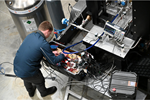Swinburne highlights composites and Industry 4.0 activities
Swinburne University of Technology’s facilities and research expertise have attained milestone developments in a UAV wingbox, customized carbon fiber components, digital manufacturing and 3D printing.
At Australian Manufacturing Week, Swinburne showcased its capabilities in everything from advanced manufacturing, high-rate and automated production, advanced joining techniques and digital transformation, to custom carbon fiber products, thermoplastic composites and 3D printed parts. Source | Swinburne University of Technology
’s (Melbourne, Australia) experts have attained several milestones in space, aerospace and automotive applications featuring the use of composite materials, as well as novel approaches to high-rate manufacturing, digital twins and joining complex components. These activities are further bolstered through Swinburne’s support of Australia’s $270.5 million research initiative that aims to transform healthcare, aerospace and construction through additive manufacturing.
Uncrewed aerial vehicle (UAV) wingbox. Developed at the Swinburne-CSIRO National Industry 4.0 Testlab, this drone wingbox highlights innovations in stamp forming and automated manufacturing processes for joining thermoplastic composite (TPC) parts. The wingbox uses aerospace-grade TPC like LMPAEK for high-performance and lightweight structures, said to be a first for Australian aerospace applications.
The automated production process features a digital twin to simulate and optimize every stage, from cutting to welding and final assembly. 
Customized carbon fiber road bike frame. Also manufactured at the Industry 4.0 Testlab, Swinburne experts guided R&D, design, engineering and production. The bike frame demonstrates Swinburne’s ability to develop products from concept to scaled production, showcasing highly intricate geometrical shapes that can be tailored to specific user needs, and highlights the university’s capability in manufacturing custom carbon fiber components for aerospace, space and defense (detection and protection) applications.
Digital manufacturing. Swinburne’s Testlab provides fully digitally supported engineering and manufacturing solutions for parts, processes and entire systems in automotive, aerospace, production and more.
The university highlights the capabilities of its Factory of the Future, its industry portal for advanced manufacturing, which focuses on digital transformation for small-to-medium enterprises. Located on the ground floor of Swinburne’s $100 million Advanced Manufacturing and Design Centre (AMDC Building), the Factory of the Future includes capabilities/services in Industry 4.0/5.0 (digital manufacturing), design to manufacture, applied AI and machine learning, software engineering and rapid prototyping, applied R&D and servitization.
The Australian Research Council (ARC) Industrial Transformation Research Hub in Future Digital Manufacturing (Digital Manufacturing Hub) is also homed at Swinburne.
3D printed parts from the Factory of the Future. Swinburne also features expertise in additive manufacturing. In particular it mentions a disc made of AlSi12 alloy 3D printed vis selective laser melting; a CubSat that has been topologically optimized, meaning the design has been adjusted to use the least amount of material while still maintaining strength and performance; and a copper-coated toilet door push plate using a Cold Spray Additive Manufacturing process.
Related Content
-
Orbital Composites wins AFWERX award for Starfighter drone fleet
Under the TACFI contract, Orbital is implementing the AMCM process to build 3D printed composite multi-mission UAS aircraft, surpassing $10 million in government awards.
-
Sulapac introduces Sulapac Flow 1.7 to replace PLA, ABS and PP in FDM, FGF
Available as filament and granules for extrusion, new wood composite matches properties yet is compostable, eliminates microplastics and reduces carbon footprint.
-
Optimizing a CFRP landing leg demonstrator
MT Aerospace achieves design for manufacturing, integrating multiple elements into one-piece structure using AFP and 3D printed tooling to meet time and budget constraints.






